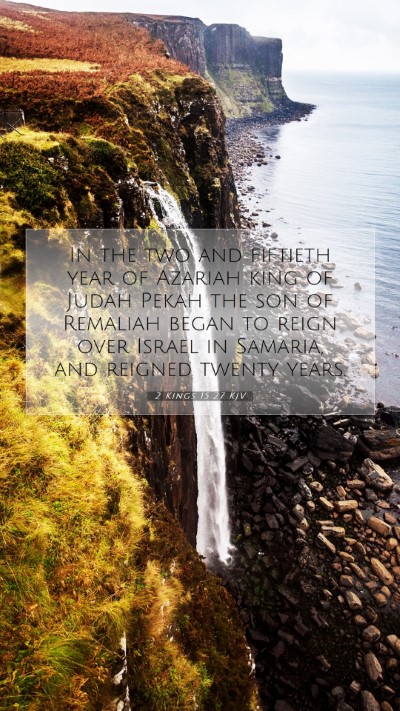Understanding 2 Kings 15:27
Bible Verse: 2 Kings 15:27 - "In the fifty-second year of Azariah king of Judah, Pekah son of Remaliah became king over Israel in Samaria, and he reigned twenty years."
Introduction to the Verse
This verse marks an important moment in the historical narrative of the Israelite monarchy. It details the ascension of Pekah as king over Israel and places it within the broader timeline of the kingdoms of Israel and Judah.
Bible Verse Meanings
The meaning of this verse serves as a chronological marker, illustrating the political landscape of the time. It reflects God's sovereignty in allowing Pekah to reign, despite the turmoil and immorality surrounding the Israelite kings.
- Historical Context: This reign occurred during a tumultuous period characterized by political intrigue and competing interests in both Israel and Judah.
- Biblical Exegesis: Understanding the reign of Pekah involves analyzing the political, social, and religious conditions of ancient Israel, where idolatry often led to divine judgment.
Commentary Insights
The commentaries from Matthew Henry, Albert Barnes, and Adam Clarke shed light on different aspects of Pekah's reign:
- Matthew Henry: He emphasizes the divine chronology and the sovereignty of God in the rise and fall of kings, reminding readers that even amidst apostasy, God's plan unfolds sovereignly.
- Albert Barnes: Barnes notes the significance of Pekah's reign as indicative of the spiritual decline of Israel, highlighting the backdrop of idolatry that influenced governance during this time.
- Adam Clarke: Clarke elaborates on the nature of Pekah’s leadership, exploring how his reign relates to previous kings and the significance of his military and political decisions in the context of Israel's history.
Bible Study Insights
When investigating 2 Kings 15:27, it's important to draw lessons relevant to contemporary readers:
- God’s Sovereignty: No matter the human failures depicted in history, God remains in control.
- Spiritual Consequences: Leadership is significant; the moral decline of Israel resulted from poor leadership choices.
- Importance of Context: Each verse fits into a broader narrative which gives deeper meaning and understanding of spiritual truths.
Cross References
Understanding this verse is further enhanced through various cross references:
- 2 Kings 15:10 - The rise of Shallum, illustrating the political instability.
- 2 Kings 15:28 - The end of Pekah's reign, reflecting God's judgment.
- Isaiah 7:1-9 - A prophetic backdrop during Pekah’s reign, showing the consequences of continued disobedience and faithlessness.
Conclusion
2 Kings 15:27 provides a concise snapshot of a crucial moment in Israel's history. It invites readers to delve deeper into the themes of divine sovereignty, the importance of righteous governance, and the tragic consequences arising from straying away from God. For those engaged in Bible study groups or online Bible studies, it is vital to explore such passages not only for their historical significance but also their applicability to modern life.
By understanding the intricacies of scripture like 2 Kings 15:27 through comprehensive commentaries and studies, one gains valuable insights that can influence the application of biblical principles (such as leadership, morality, and faith) in daily living.
Further exploration into Bible study lessons and guides can shed light on similar themes, making the engagement with scripture a profound and enlightening experience for individuals seeking deeper understanding and spiritual growth.


